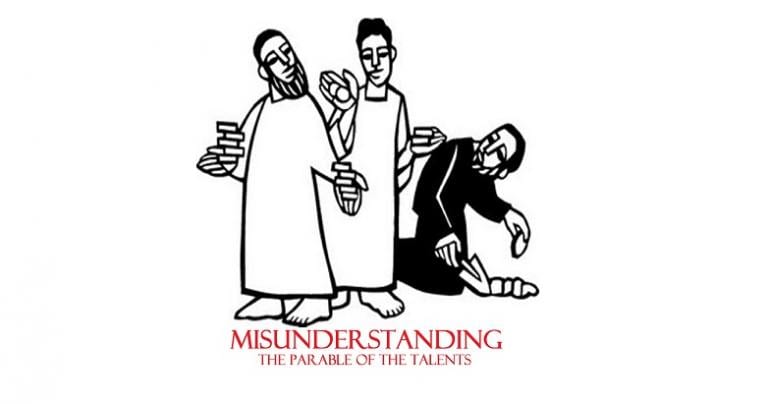
Reading the Parable of the Talents respectfully takes work, Americans!
American Christians inescapably botch the Parable of the Talents (Matthew 25:14-30), this Sunday’s Gospel. As commentators like John Pilch and Richard Rohrbaugh are quick to point out, this is not a story about the Kingdom of God. It does not begin with the usual Matthean opening line, “the kingdom of God is like…”, and for a good reason.
Considering the ruthless master in the story, would you want God to behave like him?
Here is a video on the Parable of the Talents and its variant, the Parable of the Coins (Luke 19:11-27)—
Talents & Allegory-Gone-Wild
What is the story really about? Trying to answer that, Bishop Robert Barron offers a textbook example of allegory-gone-wild. He explains the talents, a unit of weight, symbolize proper concern with the most “weighty” of all matters, the glory of God, which is really his mercy.
It sure sounds nice to say that all three servants were given shares in God’s mercy like Barron presumes. But nowhere does Jesus identify the master, the one who gives the talents, with God. Why would he? The character is a shameful douche. Turn off the Church music and read the story honestly. Ultimately, Barron is way off.
Meanwhile folks like Brant Pitre claim that this parable has Jesus making a comparison with the Kingdom of God. And like Barron, Pitre quickly allegorizes this story wildly (“this really means this, and that really means that”). But Pitre’s allegory-gone-wild takes him to contradictory conclusions than does Barron’s allegorizing. Pitre turns the douche master into God and the third servant into an ungrateful bastard.
What do you think Jesus’ Galilean starving peasant audience would make of Pitre’s interpretation? Do you think it would be good news for them? Keep in mind that at least 90 percent of agrarian populations being rural farmers. Therefore it’s a safe bet that the overwhelming majority of Jesus listeners would be peasants just like him.
Does the Master = God?
Let’s break down the parable of the talents (Matthew 25:14-30). Right off the bat, the master character (vv. 14-15) wouldn’t sit well with Jesus’ listeners. This is because, to Jesus’ mostly peasant audience, wealthy people would not be admired as U.S. Christians do CEOs and billionaires.
While many American Christians see wealth as signs of success, or even godliness, Jesus’ audience had a different idea. Rich to Gospel peasants meant greedy, folks. When you read in your Bible “rich,” just note that this is a GREEDY SOB. Do that, and you are taking into account Jesus’ audience respectfully.
The Parable of the Talents
This greedy bastard (definitely not an analog for God!) owns three slaves (vv. 14-15). Before setting off on a trip, this wicked man entrusts this trio with three sums of enormous wealth. He bestows on them amounts according to their abilities (v. 15). Soon after, Slaves 1 and 2 have doubled their sums (vv. 16-17). Meanwhile, Slave no. 3 buries his talent for safekeeping (vv. 18, 24-25).
When the greedy master returns, he applauds the first two slaves (vv. 19-23). But he ruthlessly punishes slave no. 3 (vv. 26-30). So the master angrily yanks his talent back and gives it to the first slave, insulting the third slave as both “wicked and slothful” (v. 26).
Of Talents & Capitalism
American Christians have minds shaped by capitalism. We crave what we wrongly imagine this parable is talking about. For instance, capitalists obsessing over making profits on their investments distort Jesus by transforming him into a capitalist. As Rohrbaugh explains, this parable does not encourage listeners to venturous investment and diligent labor.
Then you have the fundamentalist ministers who focus on unintended meanings accrued to the word talent that Jesus or “Matthew” could never have given it. They think it is all about self-improvement. I can’t tell you how many youth and young adult ministers I know from South Florida promote this misunderstanding.
Keep in mind that the majority of Jesus’ listeners were starving peasants. Can American “good news” (i.e., investment gains or self-improvement schemes) actually be “good news” to peasants?
The Limited Good
As Bruce Malina and John Pilch explain, first-century peasants like Jesus were committed to the idea of the Limited Good. (For a thorough explanation of the “Limited Good,” see George Foster’s “Peasant Society,” pp. 293–315, and his, “Image of Limited Good,” pp. 300–323. Also, see Dr. Bruce Malina’s “Wealth and Poverty,” pp. 354–67).
Basically, through their “Limited Good” view, peasants saw life as a zero-sum game. Therefore, all goods in the universe, material and spiritual, already exist, were distributed at creation, and there is no more to come.
In other words, the pie is limited and cannot be increased. You cut a bigger slice for yourself means you’ve inescapably cheated others because there is less pizza to go around. So that means if a biblical character has any surplus and refuses to share it with those who lack, this character must be a thief and usurper. This is because his abundance must have come by way of defrauding someone else. Consequently, for the Bible, “rich” almost always means “greedy bastard.”
This means that wealthy people were always under a microscope in Jesus’ world. Everyone suspected them because the only way they could increase their wealth had to come by way of theft and fraud. So the person who suddenly acquired more and refused to share in it was automatically a crook!—that’s the Bible, folks! And this idea of the Limited Good provides the Biblical roots for later evolved Catholic Social Teaching.
Dishonorable Increase of Talents
What was the only way rich people could increase their wealth without being shamed? Easy! Have your good-for-nothing shameless slaves manage things. This was because all Mediterraneans expected slaves to behave without any concern for honor. Thus greedy rich folks thought to hide from being shamed by doing crimes by proxy, but peasants like Jesus weren’t stupid. Ultimately, they knew what was going on!
Recall that the douche Master isn’t a good man, but a greedy bastard. How dishonorable he is gets revealed at the end of the parable when Slave no. 3 calls him “a hard man,” ruthlessly benefitting from the toil of others (v. 24).
American Christians & Talents
Well-dressed, well-fed “successful” American Christian businessmen almost always spin this. “Don’t be so hard on the master! He’s clever and industrious and encourages hard work!” These American ideas would find friendship from a specific entrepreneur I knew who would attend a Faith & Film series put together by young adults. After watching Paul Thomas Anderson’s magnificent “THERE WILL BE BLOOD,” he objected to participants criticizing Daniel Day-Lewis’ character, Daniel Plainview. “Americans like him sacrificed everything to build this country,” he said.
Yes, folks. We have a surplus population of daily communicant American “pro-lifer” Catholics. They relish canonizing Daniel Plainviews and Ebenezer Scrooges (pre-metanoia) in the world. And they vote.
A Middle Eastern Story
But our Middle Eastern New Testament ancestors would never swallow our American spin of the master in Jesus’ story. As Pilch explains, Jesus’ audience would find the greedy master as “arrogant, opportunistic, greedy, and rapacious.” Just like how they would view us, including the priests and bishops guilty of wage theft, sitting in posh rectories, schmoozing at gala dinners, and liquor lunches.
Therefore, in the world of the Bible, to be rich and not share (think Don Corleone) is to be greedy and thus evil. Thieves gain more by stealing what rightfully belongs to others, and this, according to the Gospels, is what the greedy rich do. Keep in mind that “rich” and “poor” are first political terms before being economic descriptors in the Bible. This is because the biblical “rich” have the power to keep what they have and rapaciously increase it, whereas the “poor” are helpless to defend what is rightfully theirs.
The Master Gets Richer
Look at the parable. Does this master think he’s virtuous, even godly like the typical American Christian assessment spins him? Nope!—instead, he concurs with his third slave (v. 26). He thinks the last slave should have dishonorably grown his talent by the sin of usury.
So that means that the other two slaves imitated their greedy, unconscionable master. Whereas Slave no. 3 actually behaves like an honorable freeman (doing what later rabbis recommended as the best moral option), the other two cheat by playing along with the rigged system.
Evolution of the Parable of the Talents
All canonical parables of Jesus bear complicated literary histories. Probably none of them, as they exist polished in the Synoptic Gospels, hold the exact original form they had when Jesus spoke them.
What’s the moral of the Matthean version of this parable? Is there something more to this story than the greedy rich getting richer and the poor getting screwed over (v. 29)? Does that sound like “good news” for peasants, people who lived on subsistence, and who could never amass wealth? Remember, while gospel spells “good news” for some, it’s “bad news” for others. As Rohrbaugh says, the gospel of Thanksgiving is “good news” to American families but “bad news” for turkeys!
Understood this way, could the master ever be a stand-in for God? I don’t think so, friends! Because if that’s how God is, like they say in Uganda (and Broadway), “hasa diga Eebowai!”
Gospel of the Nazoreans
Back in the fourth century, the Matthean version of the parable bugged Eusebius of Caesarea (d. 339 CE). You see, the good bishop was aware of an alternate version of the same parable. That other version was in the (currently lost) Gospel of the Nazoreans. Eusebius reports how that different version of the story went—the first slave is imprisoned, the second slave reprimanded, and the third slave blessed with joy.
The Gospels evolved, folks. So did the parables, developing into different versions. But which of these versions did Jesus tell? How much was his original story different from all these later editions (Matthew 25:14-30; Luke 19:11-27; and the lost version in Gospel of the Nazoreans)? Certainly, Jesus didn’t present it with the later additions of “Matthew” and “Luke.” These later men transformed the parable into a cautionary tale concerning diligence for the Jesus group awaiting the Kingdom. But originally, the story Jesus told—out of which grew this Sunday’s Gospel—was probably a tale of terror.
Sunday’s Gospel of the Talents
Sunday’s Gospel is Matthew’s evolved version, put together around 80 CE. According to Pilch, this version explains how to behave while waiting for the imminent Parousia and subsequent Theocracy. While “Matthew” does not recommend an imitation of greed or ever compares the master to God, he does advise being clever, even to the risk of being dishonored. Cosmic upheaval is coming any day now, and thus the Jesus group cannot afford to “play it safe!”
Certainly, Jesus risked everything for Theocracy. Look how (apparently) shamefully he died! But despite appearances, it wasn’t really shameful, was it? After all, God raised him up in glory!
So, even though we don’t have Jesus’ original parable, we have a messy, inspired version that is still useful and challenging. But how will we respectfully use it and be honestly challenged by it if we ruin it by making it into an American story? Pilch wisely warns not to distort it into Western fundraising strategies or a how-to guide at developing a better “you.”












